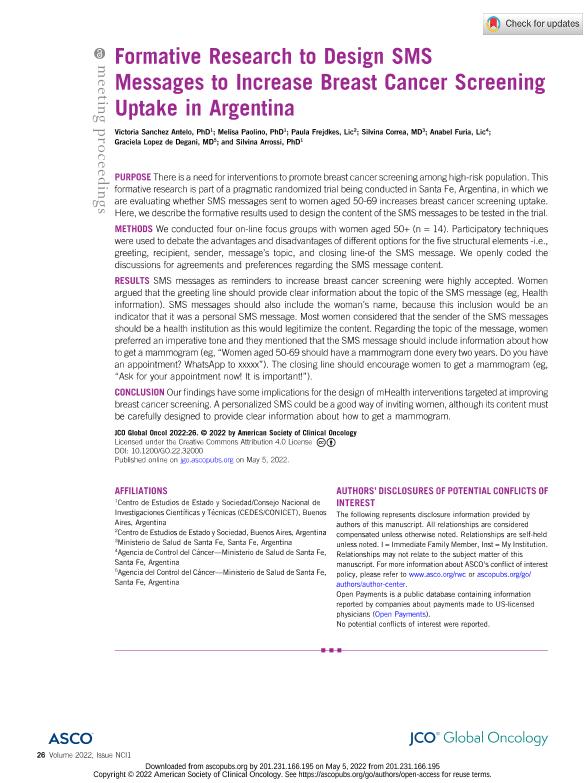Mostrar el registro sencillo del ítem
dc.contributor.author
Sánchez Antelo, Victoria Inés María

dc.contributor.author
Paolino, Melisa Delia

dc.contributor.author
Frejdkes, Paula
dc.contributor.author
Correa, Silvina
dc.contributor.author
Furia, Anabel
dc.contributor.author
Lopez de Degani, Graciela
dc.contributor.author
Arrossi, Silvina

dc.date.available
2023-06-15T13:47:21Z
dc.date.issued
2022-05
dc.identifier.citation
Sánchez Antelo, Victoria Inés María; Paolino, Melisa Delia; Frejdkes, Paula; Correa, Silvina; Furia, Anabel; et al.; Formative Research to Design SMS Messages to Increase Breast Cancer Screening Uptake in Argentina; American Society of Clinical Oncology; JCO Global Oncology; 8; 5-2022; 26-26
dc.identifier.uri
http://hdl.handle.net/11336/200703
dc.description.abstract
There is a need for interventions to promote breast cancer screening among high-risk population. This formative research is part of a pragmatic randomized trial being conducted in Santa Fe, Argentina, in which we are evaluating whether SMS messages sent to women aged 50-69 increases breast cancer screening uptake. Here, we describe the formative results used to design the content of the SMS messages to be tested in the trial. We conducted four on-line focus groups with women aged 50+ (n = 14). Participatory techniques were used to debate the advantages and disadvantages of different options for the five structural elements -i.e., greeting, recipient, sender, message’s topic, and closing line-of the SMS message. We openly coded the discussions for agreements and preferences regarding the SMS message content. SMS messages as reminders to increase breast cancer screening were highly accepted. Women argued that the greeting line should provide clear information about the topic of the SMS message (eg, Health information). SMS messages should also include the woman’s name, because this inclusion would be an indicator that it was a personal SMS message. Most women considered that the sender of the SMS messages should be a health institution as this would legitimize the content. Regarding the topic of the message, women preferred an imperative tone and they mentioned that the SMS message should include information about how to get a mammogram (eg, “Women aged 50-69 should have a mammogram done every two years. Do you have an appointment? WhatsApp to …”). The closing line should encourage women to get a mammogram (eg, “Ask for your appointment now! It is important!”). Our findings have some implications for the design of mHealth interventions targeted at improving breast cancer screening. A personalized SMS could be a good way of inviting women, although its content must be carefully designed to provide clear information about how to get a mammogram.
dc.format
application/pdf
dc.language.iso
eng
dc.publisher
American Society of Clinical Oncology
dc.rights
info:eu-repo/semantics/openAccess
dc.rights.uri
https://creativecommons.org/licenses/by/2.5/ar/
dc.subject
BREST CANCER
dc.subject
TEXT MESSAGES
dc.subject
SCREENING
dc.subject
ARGENTINA
dc.subject.classification
Políticas y Servicios de Salud

dc.subject.classification
Ciencias de la Salud

dc.subject.classification
CIENCIAS MÉDICAS Y DE LA SALUD

dc.title
Formative Research to Design SMS Messages to Increase Breast Cancer Screening Uptake in Argentina
dc.type
info:eu-repo/semantics/article
dc.type
info:ar-repo/semantics/artículo
dc.type
info:eu-repo/semantics/publishedVersion
dc.date.updated
2023-06-13T14:39:34Z
dc.identifier.eissn
2687-8941
dc.journal.volume
8
dc.journal.pagination
26-26
dc.journal.pais
Estados Unidos

dc.description.fil
Fil: Sánchez Antelo, Victoria Inés María. Consejo Nacional de Investigaciones Científicas y Técnicas. Centro de Estudios de Estado y Sociedad; Argentina
dc.description.fil
Fil: Paolino, Melisa Delia. Consejo Nacional de Investigaciones Científicas y Técnicas. Centro de Estudios de Estado y Sociedad; Argentina
dc.description.fil
Fil: Frejdkes, Paula. Centro de Estudios de Estado y Sociedad; Argentina
dc.description.fil
Fil: Correa, Silvina. Gobierno de la Provincia de Santa Fe. Ministerio de Salud; Argentina
dc.description.fil
Fil: Furia, Anabel. Gobierno de la Provincia de Santa Fe. Ministerio de Salud. Agencia de Control de Cancer; Argentina
dc.description.fil
Fil: Lopez de Degani, Graciela. Gobierno de la Provincia de Santa Fe. Ministerio de Salud. Agencia de Control de Cancer; Argentina
dc.description.fil
Fil: Arrossi, Silvina. Consejo Nacional de Investigaciones Científicas y Técnicas. Centro de Estudios de Estado y Sociedad; Argentina
dc.journal.title
JCO Global Oncology
dc.relation.alternativeid
info:eu-repo/semantics/altIdentifier/url/https://ascopubs.org/doi/10.1200/GO.22.32000
dc.relation.alternativeid
info:eu-repo/semantics/altIdentifier/doi/http://dx.doi.org/10.1200/GO.22.32000
Archivos asociados
